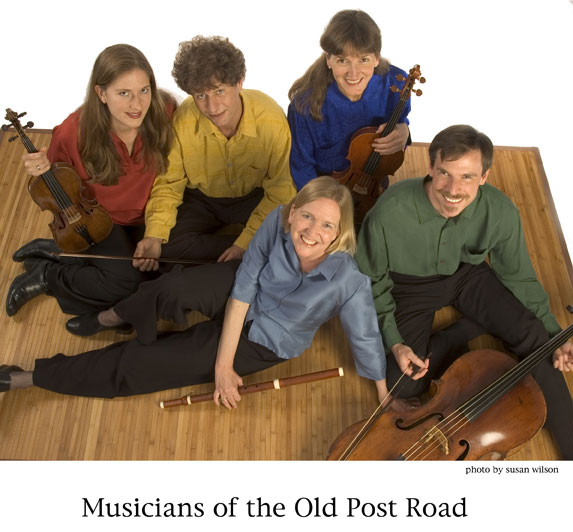Musicians of the Old Post Road
by Dermot Whittaker
The following review appeared in the October 2006 issue of Middlesex Beat. All rights reserved.
The familiar and the unexpected await lovers of Baroque, Classical, and early Romantic music in this year's concerts by the Musicians of the Old Post Road. MOPR performs music of the seventeenth, eighteenth, and early nineteenth centuries on period instruments. They treat chamber music fans to well-known and well-loved pieces, and add rediscovered compositions from the period that audiences will often be hearing for the first time.
 |
Cellist Daniel Ryan and flutist Suzanne Stumpf, musical co-directors, are joined by colleagues Michael Bahmann on harpsichord and fortepiano, Marcia Cassidy on viola, and Christina Day Martinson on violin for the chamber ensemble's eighteenth concert series. "This is our first full season with our new violinist and we are certainly very excited by the musical explorations that we'll be doing together," says Ryan.
MOPR's concert series began in 1989 as Old Post Road Historic Concerts; the venues were meetinghouses, churches, mansions, museums, and public halls in towns along route 20, what in the 1700s was called the Boston Post Road. The tradition continues this season, with four performances in Boston and another four in Wayland, Sudbury, and Worcester. The sites outside Boston typically seat 100 to 200 people. These old rooms are ideal settings for chamber music. Of the First Parish in Wayland and First Parish in Sudbury meetinghouses in particular, Stumpf says, "The acoustics are just so beautiful, and very warm. They are resonant but with a good clarity."
Clarity as much as tone is vital to the performances, where artistry comes right to the fore. "When you play an historical instrument, you're consciously making the attempt to get into the culture and sound world of the period of music that you're playing, I think on a much more direct level than many modern instrument performers do," says Ryan. Stumpf's transverse baroque flute, for example, plays more simply in some keys than in others. The resulting sounds vary as well: some keys seem naturally warm and others, in Stumpf's words, are "more mellow, more transparent, more ethereal, sometimes mysterious" -- qualities that a period composer would have expected when writing in different keys. The cello, viola and violin in the ensemble are strung with gut rather than steel. "The bow action is much lighter," says Ryan, "so a lot of the very fast passage work that baroque music often has comes out very clearly and very articulately."
Ryan and Stumpf became interested in historical instrument performance in college (Boston University and Longy School of Music for Ryan, and Wellesley for Stumpf). Program planning for MOPR -- uncovering neglected pieces and breathing life into them -- begins with their research. The process involves reading in musicological journals and histories, identifying and then studying music manuscripts and scores (many published for individual instruments only), reconciling or understanding inconsistencies in the scores, and interpreting the music with the expertise of the whole ensemble.
Outreach to youngsters has been a part of MOPR's mission for years. Linda Wolk of Newton, a consultant in social-emotional learning for Open Circle at Wellesley College, listened last spring while MOPR held the attention of 150 third to fifth graders at Dorchester's William Monroe Trotter School for nearly an hour. "They really know how to relate to children in a way that engages them," says Wolk. "Not all musicians can do that and also perform." MOPR has a Kids Come Free policy for nearly all concerts. Children age 7 to 17 accompanied by an adult may attend the series concerts free of charge. (This season's exception because of limited seating is the Worcester Historical Museum concert on October 22).
In October 2006, MOPR will perform Bach's Brandenberg Concerto no. 5 along with other concertos that highlight the conversational qualities of the period instruments and compositions. A Corrette concerto, says Ryan of one of the evening's lesser-known compositions, "has three solo instruments -- violin, flute, and harpsichord -- and they are all completely intertwined." The October performance includes a piece by Stölzel, a flute concerto recently out in modern edition and likely to be a new listening experience for concert-goers.
Mezzo-soprano Pamela Dellal joins the Musicians of the Old Post Road for their December 2006 concert which will feature German cantatas and arias of the seventeenth and eighteenth century. With many of the songs in the soprano range, she is conscious of using her voice color to complement the sounds of the baroque flute and violin. She loves the chance to sing with MOPR, with whom she first collaborated in a recording of Scottish song settings by J. N. Hummel in 1999. "The way that I work with them, I really feel like I'm a member of a chamber ensemble, that all of us are giving input on various aspects of interpretation," says Dellal.
Works by Handel, including the little known Apollo e Dafne, will be featured in the February 2007 concert. In March 2007, MOPR explores gypsy influences in the music of Haydn and Mozart. "We know that they were exposed to gypsy music and music of Bohemian composers," says Ryan, "and we thought that it might be fun to pair these gypsy style works and other Bohemian composers and perhaps even some gypsy music of the period to see how these composers really internalized this music."
The Musicians of the Old Post Road have released four CDs, including The Virtuoso Double Bass (Titanic, 1994), Trios and Scottish Song Settings of J. N. Hummel (Meridian, 1999), Galant with an Attitude: Music of Juan and José Pla (Meridian, 2000), and Telemann & Bodinus Quartets (Meridian, 2003). MOPR's website -- including schedule and description of concerts, and links to ordering tickets online -- is mysite.verizon.net/vze1k22h1
Copyright, Middlesex Beat, 2006. All rights reserved.